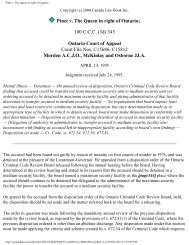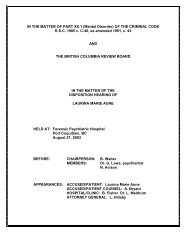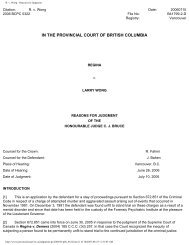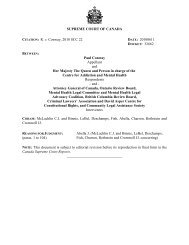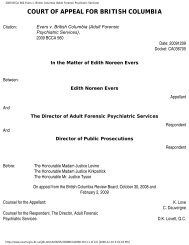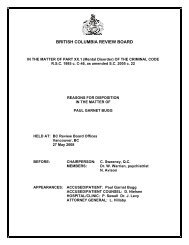R. v. Cuerrier - British Columbia Review Board
R. v. Cuerrier - British Columbia Review Board
R. v. Cuerrier - British Columbia Review Board
Create successful ePaper yourself
Turn your PDF publications into a flip-book with our unique Google optimized e-Paper software.
R. v. <strong>Cuerrier</strong><br />
social occasion -- the handshake or social buss -- are transformed by fiat of judicial pen into crimes,<br />
provided it can be shown that the accused acted dishonestly in a manner designed to induce consent, and<br />
that the contact was, viewed objectively, induced by deception. No risk need be established, nor is there<br />
any qualifier on the nature of the deception. Will alluring make-up or a false moustache suffice to<br />
render the casual social act criminal? Will the false promise of a fur coat used to induce sexual<br />
intercourse render the resultant act a crime? The examples are not frivolous, given the absence of any<br />
qualifiers on deception. A third difficulty is that this approach, like that of Cory J., suffers from<br />
imprecision and uncertainty. The test is said to be objective. Yet what constitutes deception is by its<br />
very nature highly subjective. One person's blandishment is another person's deceit, and on this theory,<br />
crime.<br />
53 Not only is the proposed extension of the law sweeping, it is unprecedented. We have been told<br />
of no courts or legislatures in this or other countries that have gone so far. To the extent that Canadian<br />
law has criminalized deception, it has done so only where the deception results in actual harm or a risk<br />
of harm. The rule proposed by L'Heureux-Dubé J. would eliminate the need to show risk of harm and<br />
make deception alone the condition of criminal responsibility for sexual contact. Overbreadth on this<br />
scale cannot be cured by administrative action. Prosecutorial deference cannot compensate for<br />
overextension of the criminal law; it merely replaces overbreadth and uncertainty at the judicial level<br />
with overbreadth and uncertainty at both the prosecutorial level and the judicial level.<br />
54 The theoretical difficulties with both proposals put forward by my colleagues are matched by<br />
the practical problems they would introduce. The changes proposed are of great consequence. The law<br />
does not presently make it an offence to engage in sexual contact without disclosing to one's partner<br />
possible risks, as Cory J. proposes. Nor does it make every deception inducing consent to physical<br />
contact a crime, as L'Heureux-Dubé J. proposes. What we know about the spread of HIV and other<br />
venereal diseases suggests that thousands of people engage in just such conduct every day.<br />
Henceforward, if the sweeping changes suggested are accepted, these people will be criminals, subject to<br />
investigation, prosecution and imprisonment. Literally millions of acts, which have not to date been<br />
regarded as criminal, will now be criminalized. Individual liberty will be curtailed. Police, prosecutors,<br />
the courts and the prisons will be dramatically affected. Such a change, if it is to be made, is best made<br />
by Parliament after full debate as to its ramifications and costs.<br />
55 The broad extensions of the law proposed by my colleagues may also have an adverse impact on<br />
the fight to reduce the spread of HIV and other serious sexually transmitted diseases. Public health<br />
workers argue that encouraging people to come forward for testing and treatment is the key to<br />
preventing the spread of HIV and similar diseases, and that broad criminal sanctions are unlikely to be<br />
effective: J. D. McGinnis, "Law and the Leprosies of Lust: Regulating Syphilis and AIDS" (1990), 22<br />
Ottawa L. Rev. 49, at p. 59. Criminalizing a broad range of HIV related conduct will only impair such<br />
efforts. Moreover, because homosexuals, intravenous drug users, sex trade workers, prisoners, and<br />
people with disabilities are those most at risk of contracting HIV, the burden of criminal sanctions will<br />
impact most heavily on members of these already marginalized groups. The material before the Court<br />
suggests that a blanket duty to disclose may drive those with the disease underground: see, for example,<br />
R. Elliot, Criminal Law and HIV/AIDS: Final Report (March 1997); J. M. Dwyer, "Legislating AIDS<br />
http://ql.quicklaw.com/qltemp/C2KEwCMAFbZMTYcs/00011scr-00019415%2ehtm (22 of 44)2007-08-21 1:18:15 PM



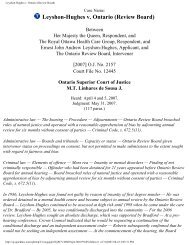
![LaFortune [LaFortunate] (Re) - British Columbia Review Board](https://img.yumpu.com/42779845/1/190x245/lafortune-lafortunate-re-british-columbia-review-board.jpg?quality=85)
